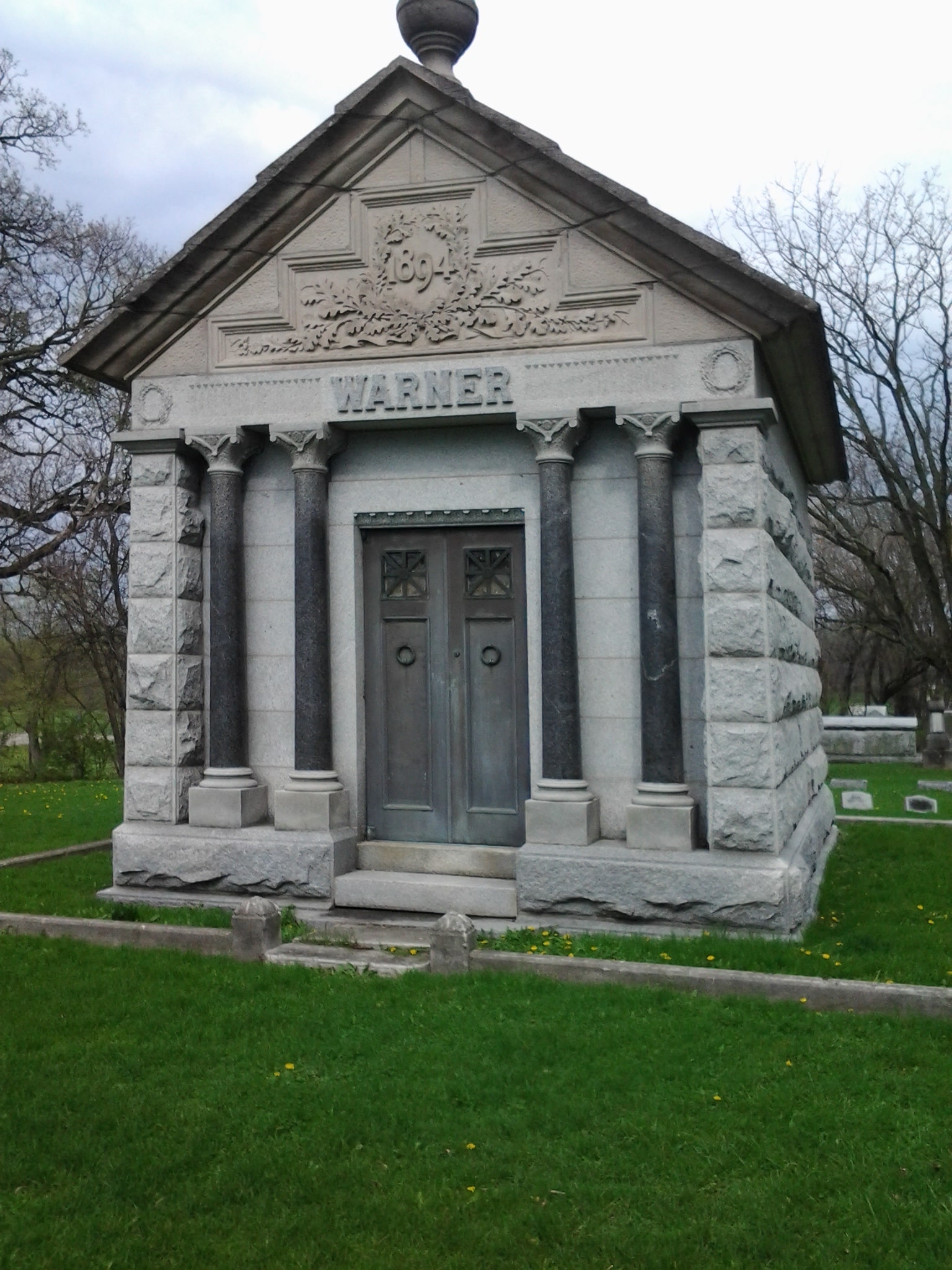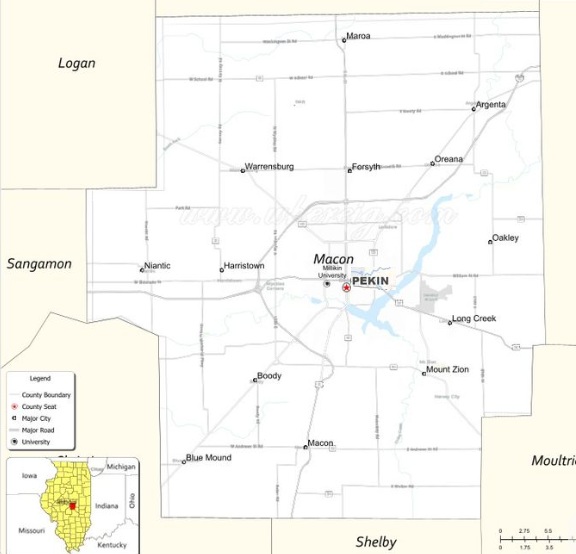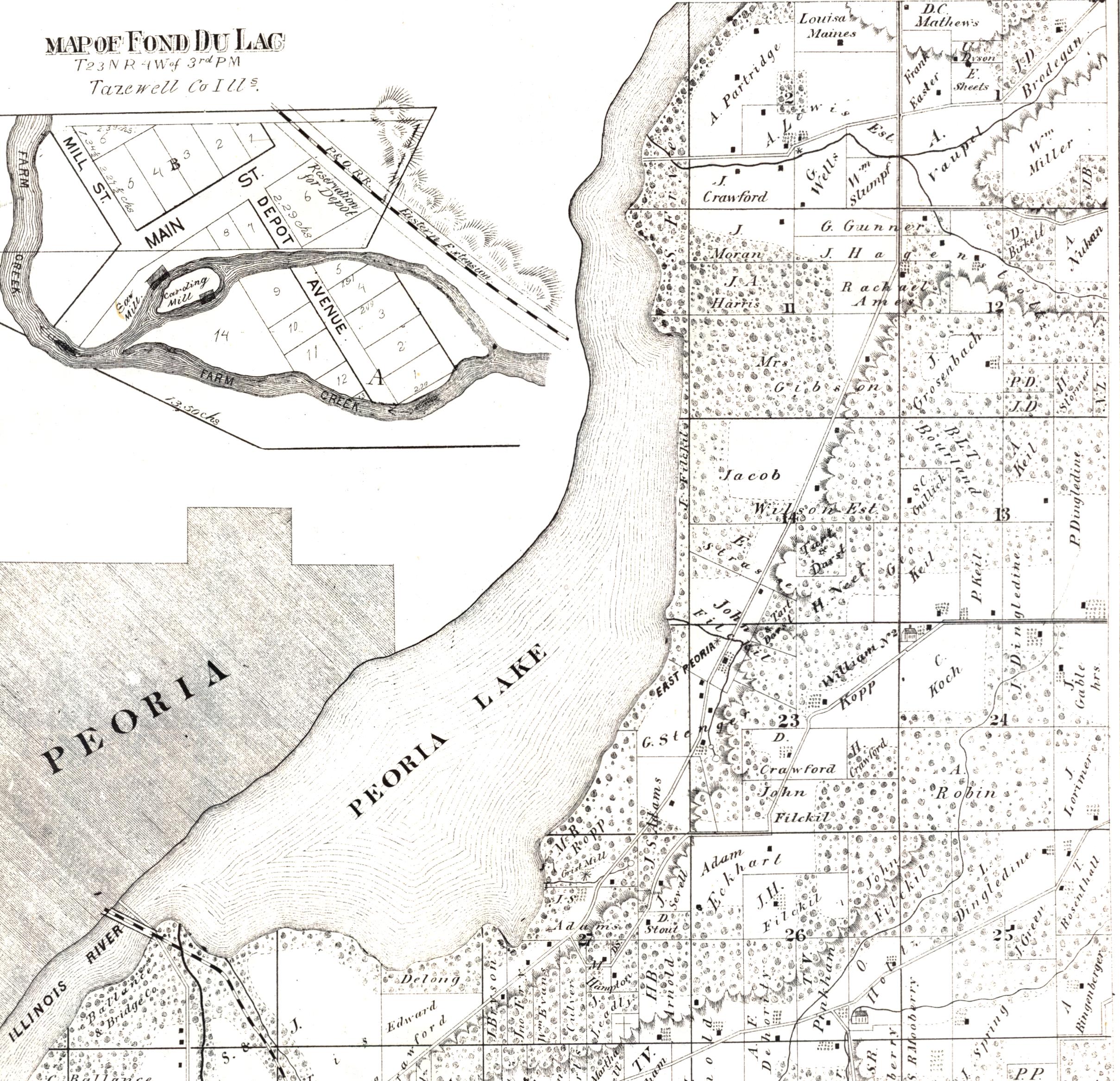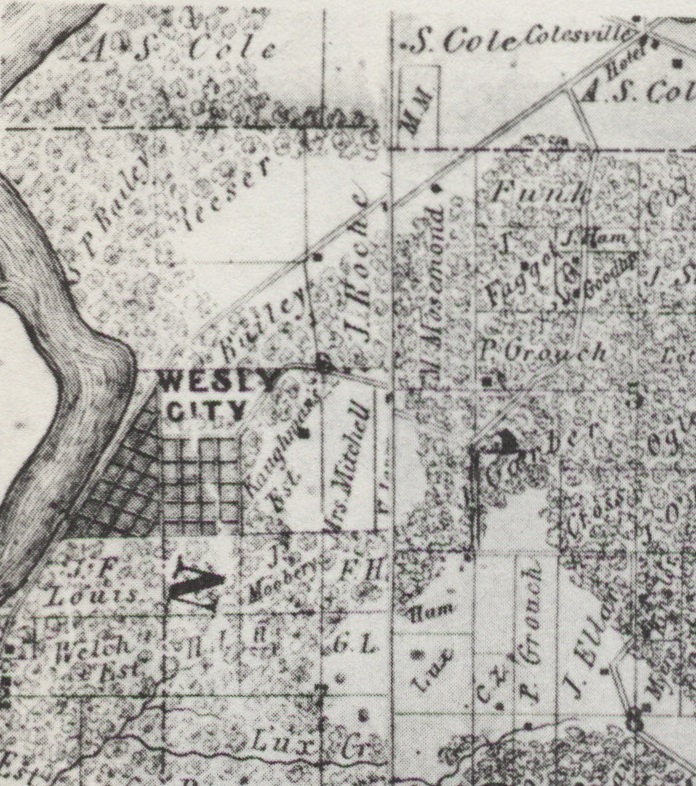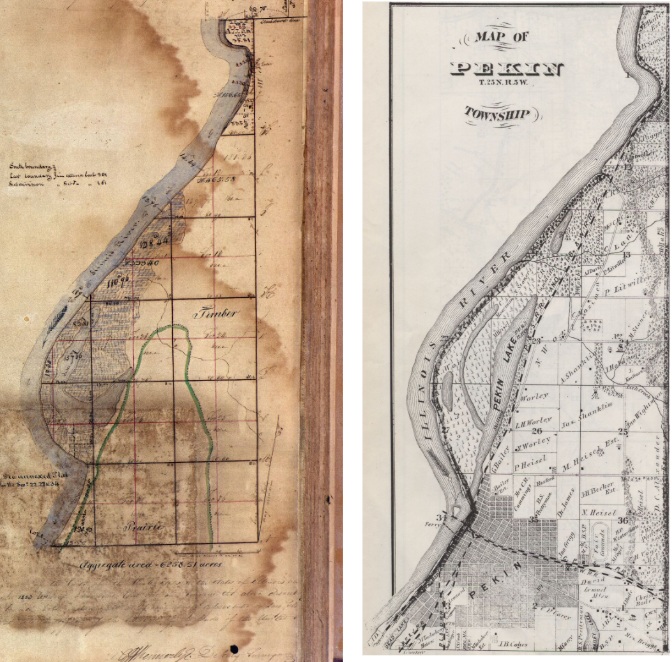Three weeks ago we reviewed Dr. W. E. Schenck’s 1905 list of the pioneer doctors of Pekin. Heading Schenck’s list was a mysterious Dr. John Warner, of whom Schenck wrote:
“Dr. John Warner was the first physician of whom we can find any account in Tazewell County. He was located in Pekin at the time of the Deep Snow — the last days of December, 1830. Nothing more can be learned.”
A tip from Dan Korowicki in an Illinois history Facebook group directed me to the 1901 “History of DeWitt County, Illinois,” Vol. I, which includes several references to a pioneer doctor of Clinton, Illinois, named Dr. John Warner.
Could this be the Dr. John Warner who is said to have been living in Pekin at the time of the Deep Snow of Dec. 1830? To find the answer, let us consider each of the references to Dr. John Warner of Clinton in the 1910 DeWitt County history.
On page 127, we find:
“John Warner was appointed swamp land agent in Dec. 1859 – he reported in 1863 that he had received $679.30 swamp land funds. Of this amount he turned over to the county $308.44, after deducting expenses and commissions.”
“Swamp land agent” was a De Witt County official who was appointed by the county to seek and recover funds for county swamp land that the federal government had sold off in violation of the federal Swamp Lands Act. Although this reference alone does not say John Warner was a physician, a later reference in the volume indicates this was Dr. John Warner of Clinton.
Then on page 129 we learn that John Warner was also a successful banker:
“$175,000 in new bonds were issued in denominations of $1,000, and after considerable difficulty in marketing them, the banking firm of John Warner & Company of Clinton undertook to sell them on a commission of one-eighth of one per cent, and within a year thereafter the whole amount had been disposed of.”
The financial success of Dr. John Warner of Clinton is illustrated by this reference on page 132 to his will, which his second wife successfully contested and overturned in her favor:
“It would be unprofitable to enumerate the various cases, of minor or even major character, that have been tried in this court for the past fifty years. Brief mention may be made, however, of two famous will cases that were tried in this county within the past year or so. The cases referred to are those of the late Colonel Thomas Snell and the late Dr. John Warner, both of whom died leaving estates worth over a million dollars each and whose wills were contested by interested parties. The provisions of Colonel Snell’s will were left intact by the court, but the will of Dr. Warner was broken by his second wife.”
Given Warner’s evident prominence and success, it is no surprise that (as stated on page 135) John Warner also was elected to the office of DeWitt County Circuit Clerk, serving from 1848 to 1852.
The last two notices of Dr. John Warner in the 1910 DeWitt County history, found on pages 266 and 267, describe his career as a respected pioneer physician. On page 266, Dr. Warner is listed as DeWitt County’s second pioneer physician:
“Dr. John Warner arrived in Mt. Pleasant, now Farmer City, about the 20th of June, 1840, and stopped at the hostelry of the village, which was kept by John Smith. Here Dr. Warner and his young and newly made bride abided until a cabin 12 x 12 was procured, and he here began his first experience as the head of a family under his own rooftree. Here the young physician practiced his profession for two years, when he moved to Clinton and became prominent not only in his profession but also as a business man, banker and capitalist. He died December 21, 1905, in the eighty-seventh year of his age.”
Then on page 267, Dr. J. D. Gardner is mentioned as having been trained as a physician by Dr. John Warner:
“Dr. J. D. Gardner came to Illinois in 1841, and studied medicine with Dr. John Warner at Farmer City. After receiving his license to practice he located in Mahomet, where he remained twelve years and then returned to Farmer City. He died in 1903, in his eighty-fourth year.”
From these references, we might have evidence that Dr. John Warner had lived in Pekin in 1830, but later relocated to Dewitt County by 20 June 1840.
There is, however, a serious problem with identifying the Dr. John Warner of Pekin as Dr. John Warner of Clinton, and that is the fact that Dr. John Warner of Clinton is known to have been born in Rockingham County, Virginia, on 24 July 1819, a son of David and Catherine Warner. (Dr. Warner died 21 Dec. 1905 in Clinton, and is entombed there in the Warner mausoleum in Woodlawn Cemetery.) Thus, he would only be 11 years old at the time of the Deep Snow of 1830, obviously not old enough to be practicing medicine in Pekin that year.
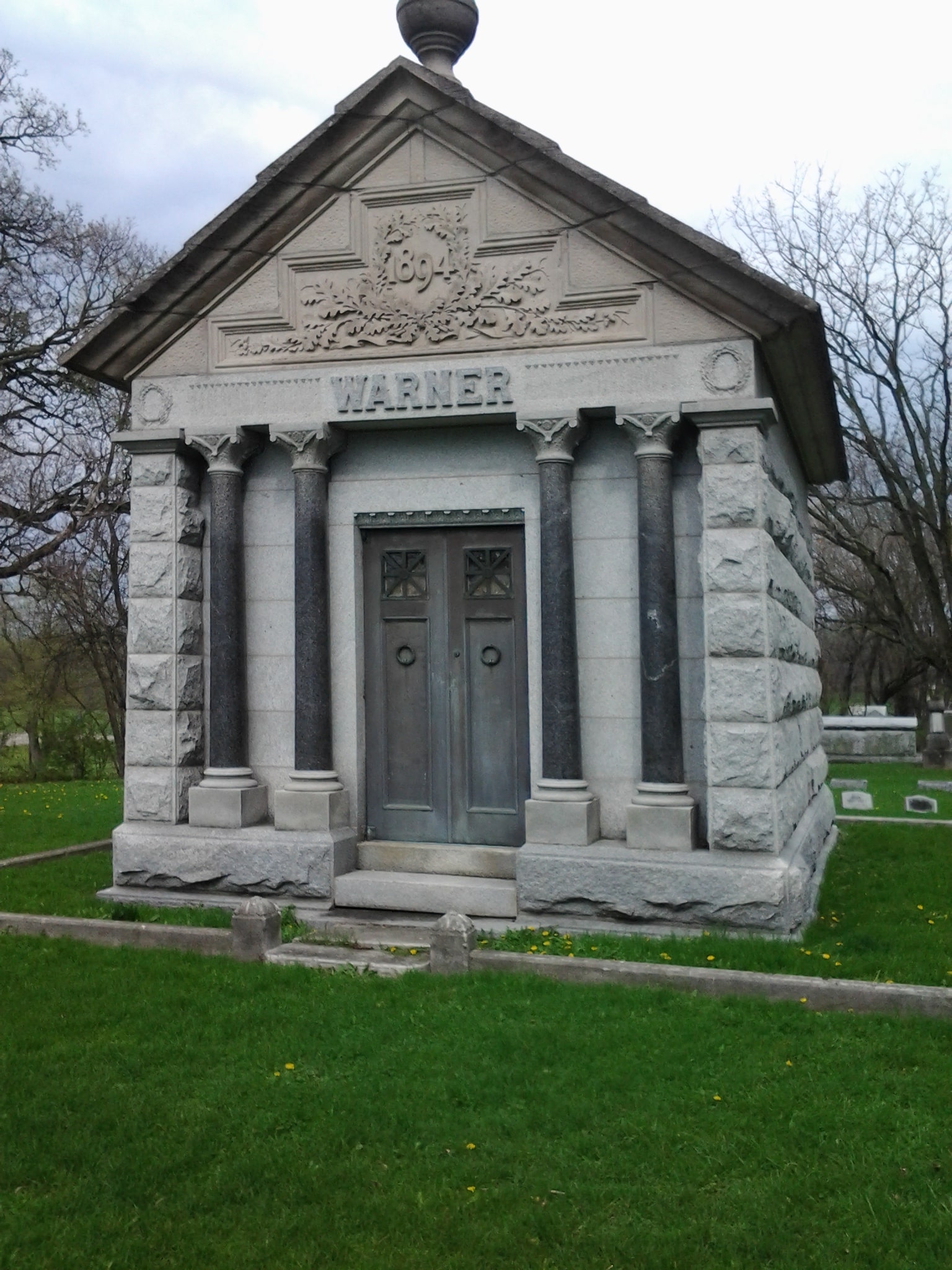
It would appear that we are dealing with two different Drs. John Warner, one who briefly lived in Pekin and another who arrived in DeWitt County in 1840 when he was about 21 years old. On the other hand, perhaps Dr. Schenck had bad information, and the one and only Dr. John Warner (of Clinton) briefly sojourned in Pekin during a later winter, and Dr. Schenck or his informant mistakenly identified that as the winter of the Deep Snow.
Most likely they were simply two different Drs. John Warner, because Dr. John Warner of Clinton did not arrive in Illinois until 1840, the same year he settled in Farmer City.
A length biography of Dr. John Warner of Clinton was included in his obituary, published in the Clinton Register on 22 Dec. 1905:
“END OF A BUSY LIFE.
“Dr. John Warner Dies at His Home After Brief Illness Yesterday Afternoon.
“CLINTON’S OLDEST BUSINESS MAN.“Was Eighty-Six Years Old; Had Lived in Clinton Sixty-Two Years; and Had Been Engaged in Banking Nearly Forty Years Known Throughout the State.
“Dr. John Warner is at rest. After a busy pilgrimage of four score and six years he answered the final roll call. For several years his health had been failing, but he journeyed on giving little heed to the warning that comes with ripened age. Though several years past the eightieth mile post in the journey from the cradle to the grave he continued in business and attended to most of the affairs pertaining to his large landed estates. He realized the danger to one of his years from overwork, but his courage, like his bravery on the field of battle, would not allow him to shrink from his personal duty. It was not until about a year ago when paralysis deadened and weakened his physical powers, that he was compelled to lessen his attention from business. He recovered sufficiently to go about and seldom was there a day when his familiar form was not seen about his place of business. But little more than twenty-four hours before his death he was at his banking house, and not feeling well he returned home at 2 o’clock. Soon afterward he complained of pains in his breast; his physicians were summoned, and his family was informed of his dangerous condition. He grew worse and a few minutes after 3 o’clock yesterday afternoon the end came. Dr. Warner began life at the bottom of fortune’s ladder; by steady and industrious effort he had ascended well up on its coveted rounds. After the invaluable schooling of farm life, he resolved to seek a new field of labor. After a few months as teacher he began the study of medicine and receiving his diploma sought opportunity in the then West. He drifted to DeWitt county, which became his field of action. The outlook was not bright, but his ambition and determination opened the way to success. Hope parted the clouds and sunshine cast its encouraging rays along his pathway. His safe reasoning and keen foresight led him to invest his money in the rich prairie land that was then considered, by many, almost worthless. Its rapid advance in price soon added greatly to his wealth, and in 1867, in company with Henry Magill, Lawrence Weldon and J. R. Warner, under the firm name of John Warner & Co., he engaged in banking, which he had since continued. For seven years previous to enlisting as a soldier he was in the mercantile and real estate business. His wealth grew until he had long been one of the wealthiest men in Central Illinois. Besides the controlling interest in the bank he owned five business buildings and several residences in Clinton, besides the palatial homestead at the south limits of the city. His landed interests are vast. In DeWitt county he owns . . . acres; he also owned a farm near Olney, Ill., two or three farms in Indiana; a farm near Lincoln, Neb., and about 700 acres in Iowa. There seems no doubt of this estate being more than $1,000,000, which has been the result of his own efforts. A fitting monument to his enterprise and benevolence is the new hospital, a view of which is given on this page. Last spring he set apart $25,000 for the building and endowed it. The hospital is enclosed, but will not be completed for several weeks. It will be a pride to Clinton and will endear Dr. Warner’s memory to every citizen.
“John Warner was born in Rockingham county, Va., July 24, 1819, his parents being David and Catherine Warner, of German descent. They lived on a farm and there in the beautiful valley the first sixteen years of his life were spent. Sept. 3, 1835, they started westward in two wagons. They crossed the Allegheny mountains and reached Wayne county, Indiana, late in the following month, where they spent the winter. In March of the following year they moved to Henry county where the father had purchased a farm. One year later John began teaching school at $25 a month, and at the same time began the study of medicine under a medical firm of Anderson. Oct. 30 of that year he was married to Miss Cynthia A. Gardiner, of the same county, and June 2 of the following year they started westward with no particular place for location in view. Eighteen days later they landed in Mt. Pleasant, now Farmer City. There were only five residences and one hotel in the town. The hotel was kept by John Smith, and they remained there until he could procure a house, and it was only 12×12 feet. He lived there and practiced medicine two years when he moved to Clinton, which had since been his home. He continued the practice of medicine until he had spent about twelve years in that work, though he always disliked it, and engaged in another business at the first desirable opportunity. From 1848 until 1852 he was clerk of the circuit court. When the Civil war began he was among the first in the county to enlist, and raised a company and was made major of the 41st regiment Illinois Volunteer Infantry. He was at the surrender of Ft. Henry; in the battles of Ft. Donelson, Shiloh, Davis Bridge, the Hatchie and Corinth. At Shiloh he contracted chronic diarrhea, from which he never fully recovered. On account of this he resigned his position and returned home. In 1865 his wife died. May 28, 1874, he was married to Miss Isabella Robinson, of Huron county, O. He served one term in the legislature, from 1864 to 1866. In 1867 he engaged in the banking business, and had since continued in that business, though his health for a few years had prevented his taking an active part in the work, yet he seldom missed being at the bank every day when able to be from home. The bank-room had been his business home nearly forty years, and it was only fitting that he be there only a few hours before the closing of his earthly career. Dr. Warner is survived by his wife and the following children: Vespasian Warner, Commissioner of Pensions; Mrs. Harrison Mettler, of Chicago; Mrs. Grant Bell, of Clinton and Florence, of New York City; his grandchildren and the child of Dr. and Mrs. Mettler and the children of Vespasian Warner. They are Clifton M., John and Mrs. Guy G. Dowdall, of Clinton; Vesper M., of Kansas, and Mary Frances, who is attending school in Pennsylvania, but arrived home yesterday. Their father will arrive from Washington tomorrow afternoon. Dr. Warner was a member of no church but was strongly inclined to the Universalist church, of which his wife is a member. He was a liberal contributor to the building fund of that church and gave it the new pipe organ which cost $2000, making a total cost of over $3000. The funeral services will be held Sunday at 2 o’clock at the residence, conducted by Rev. C. E. Varney. Burial in Woodlawn cemetery.”


